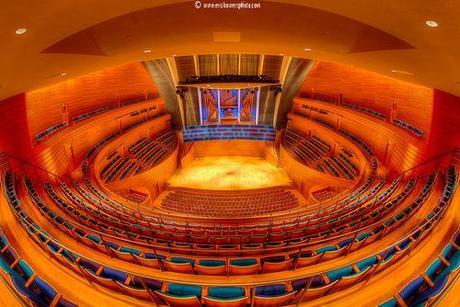Tonight, I will be singing in the Conservatory's production of Carmina Burana. I know you all know it - CLICK HERE TO SEE IF YOU DO. We will also be performing some exciting world premiere pieces including one by the current Pulitzer Prize winner in music, Zhou Long, who is an instructor at the Conservatory here in Kansas City. You can watch it live on the internet here at 7:30: http://www.umkc.edu/ia/streaming/live-streams.cfm

I have to say that all the time I've spent this weekend in Helzberg Hall has been absolutely incredible. If you are a choral music person, there is no better place on earth to sing than Helzberg. I guarantee it will be a religious experience - it's the perfect place for singers. It's no wonder why many of the greatest singers in the world have scheduled performances here in the coming year. For example, Juan Diego Florez, the most famous tenor in the world, sang a recital here yesterday. He only scheduled recitals for Paris, Salzburg, Vienna, and Kansas City! This place is for real...if you are living in the area, and haven't seen it, you are missing one of the world's greatest performing venues.
But, the biggest event for me this week is certainly my Doctoral Recital:
"Wir wollen Deutsche bleiben"7:30 PMTHIS SATURDAYFebruary, 25, 2011White Recital HallKansas City, Missouri
It should be, hopefully, one of the most unique recitals that you have heard in a long time. I have waited several years to put this particular recital together. Watch the video below and I'll explain some of the really unique things that I will be doing.
The phrase "wir wollen Deustche bleiben" or "we want to remain German", was a phrase that the Volga Germans used to solidify the importance of their ancestry in the face of this horrific slaughter. They were influenced by many cultures and governments but they desired to peacefully live in their agricultural society with a simple but vibrant Germanic society. Knowing their sacrifice and that their struggle, known as the Forgotten Genocide, completely obliterated their world, I too feel that it is important to keep at least this small portion of their story and culture alive.
I will begin the concert with "Ach, wenn Mutter Wolga" by Cui. Cui was a famous Russian composer and this is a patriotic hymn to the Tsar. It was originally written in Russian, but I will sing it in German. The Volga Germans were forced to sing these in the early 20th century. It sounds very "Russian" with a somber mode, but if you understand that the point of this concert is to celebrate the Volga Germans, you should know that this is about the darkest and saddest of all songs. Tsar Nicholas II initiated the genocide on the Volga Germans, so to sing a patriotic song in German, would be the equivalent of Jews in Poland being forced to sing a song praising Hitler in Polish. It is gut-wrenching.
Then I will sing some songs that highlight the many cultures of their part of the world. They lived in an area that was filled with many cultures because of the trade routes between Asia and Europe. They were influenced by India, China, Persia, Russia, and Western Europe. So, I will sing the first movement from Ravel's Scheherazade. Scheherazade is a famous Persian tale, and the first movement is called "Asie" or Asia. It talks about China, India, and all the wonders and dangers in the Orient. It is normally sung by a mezzo, but is written for high voice and clearly with tenor in mind. However, I will be making one of the only tenor Scheherazade recordings that I know of existing, so it should be very unique. I will follow that by singing an aria from the Russian composer, Rimsky-Korsakov, called "Chanson Indoue" or The Song of India. Both of these selections are in French. How perfectly multicultural!
Then I will sing Respighi's "Nebbie" - a tenor favorite. Respighi was an Italian composer, and this piece is in Italian describing the fog rising and setting, a very spooky allegory to life and death. Respighi was a student of Rimsky-Korsakov and was the principal violinist of the Russian Imperial Orchestra in St. Petersburg.
I will also include some selections that highlight the cultural history of the Volga Germans, which obviously includes German music - so, I will sing a short lied by Brahms and a tenor favorite by Wolf, both German/Austrian composers.
Then I will sing Lenski's Aria from Tchaikovsky's opera Eugene Onegin. It is in Russian and certainly one of the most famous Russian arias of all time.
Lastly, I will sing the World Premiere of John Mueter's "Three Volga German Folk Songs". I contacted the library at the conservatory in Salzburg where they have a massive collection of folk songs of Germanic peoples. They were very kind to allow me to search high and low for songs with their origin in the lower Volga river region. I found about 30 and they sent them to me over the internet and I sent some of them to John, who was very eager to work on the project.
He composed three songs "Abschied", which is a beautiful song of farewell, then "Soldatentod", which tells the story of a soldier's death on the battlefield with gruesome depictions of the dead scattered under the moonlight, and finally "Der Zecher", which is about a drunk that is sitting at home drinking when Death shows up at his door. The drunk offers Death a drink, but Death pours it out as a toast to his cousin, Plague's, health. Death then asks "do you think I can be sold with a drink?" but the drunk pleads, "I'm trying to become a doctor, and if you let me live, I'll give you half my patients." Death agrees to let the drunk live as long as he is his obedient servant. So, the piece ends with the drunk, drunkenly singing the joys of living forever because of his deal with Death. All of these are in German, natürlich.
I have been wanting to do a program like this for several years, and I am very excited to present it this Saturday. It means so much to me because this is my ancestry, its culture is dying very fast, and it is the 70th anniversary of the mass deportation of the Volga Germans to the GULAG labor camps. After the genocide, most of the Volga Germans either fled to the United States or Germany or were assimilated into USSR, losing their language and with it, much of their culture. Today, the most vibrant culture is in the middle of the United States where they still cook, speak, dance, and drink like they did in the Volga region. However, with the loss of their language in recent generations, there just aren't enough decedents to promulgate their culture further. Sadly, it all was irreversibly destroyed in the genocide.

